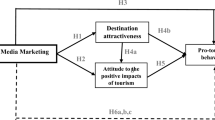Abstract
The majority of the studies on destination image have so far mainly focused on the cognitive and affective components, and there is still a lack of research on the conative component of destination image (i.e., the declaration of a behavioral intention). Moreover, less research has been done on verbally reported self-perception on the baseline image (prior belief about a destination), and the enhanced image (after an exposure to online contents). This study shows the effect of social media exposure on the perceived image about tourism destinations. In particular, declarations of the intention to visit the destination (image conative component) were found on the reported perceived image about a destination. In general intention to visit the destination was influenced by the stimuli and in the same direction, if it was positive the results show an interest in visiting the city and vice a versa.
Access this chapter
Tax calculation will be finalised at checkout
Purchases are for personal use only
Similar content being viewed by others
References
Agapito, D., Oom do Valle, P., & da Costa Mendes, J. (2014). The cognitive-affective-conative model of destination image: A confirmatory analysis. Journal of Travel & Tourism Marketing, 30(5), 471–481.
Beerli, A., & Martin, J. (2004). Factors influencing destination image formation. Annals of Tourism Research, 31(3), 657–681.
Crompton, J. L. (1979). An assessment of the image of Mexico as a vacation destination and the influence of geographical location upon that image. Journal of Travel Research, 17(4), 18–24.
Echtner, C., & Ritchie, B. (1993). The measurement of destination image: An empirical assessment. Journal of Travel Research, 32(4), 3–14.
Fesenmaier, D. R., Werthner, H., & Wöber, K. (2006). Destination recommendation systems: Behavioral foundations and applications. Oxfordshire: Cabi.
Gartner, W. C. (1986). Temporal influences on image change. Annals of Tourism Research, 13(4), 635–644.
Gartner, W. C. (1989). Tourism image: Attribute measurement of state tourism products using multidimensional scaling techniques. Journal of Travel Research, 28(2), 16–20.
Gartner, W. C. (1993). Image formation process. Journal of Travel & Tourism Marketing, 2(2/3), 191–216.
Govers, R., & Go, F. (2009). Glocal, virtual and physical identities, constructed, imagined and experienced. Basingstoke: Palgrave Macmillan.
Gretzel, U. (2006). Consumer generated content - Trends and implications for branding. e-Review of Tourism Research, 4(3), 9–11.
Howard, J. A., & Sheth, J. N. (1969). The theory of buyer behavior. New York, NY: Wiley.
Li, X., Pan, B., Zhang, L., & Smith, W. (2009). The effect of online information search on image development. Insights from a mixed-methods study. Journal of Travel Research, 48(1), 45–57.
Marchiori, E., & Cantoni, L. (2012). The online reputation construct: Does it matter for the tourism domain? A literature review on destinations’ online reputation. Journal of Information Technology & Tourism, 13(3), 139–159.
Marchiori, E., Inversini, A., Cantoni, L., & Dedekind, C. (2010). Towards a tourism destination reputation model. A first step. In Proceedings of the 6th international conference “thought leaders in brand management” (pp. 921–930). Lugano, Switzerland, April 18–20, 2010). CD-ROM (ISBN: 978-88-6101-006-2).
Marchiori, E., Cantoni, L., & Fesenmaier, D. (2013). What did they say about us? Message cues and destination reputation. In L. Cantoni & Z. Xiang (Eds.), Information and communication technologies in tourism (pp. 22–25). New York, NY: Springer.
Morgan, N., Pritchard, A., & Pigott, R. (2003). Destination branding and the role of the stakeholders: The case of New Zealand. Journal of Vacation Marketing, 9(3), 285–299.
Morgan, N., Pritchard, A., & Pride, R. (2004). Destination branding: Creating the unique destination proposition. Butterworth-Heinemann: Elsevier.
Passow, T., Fehlmann, R., & Grahlow, H. (2005). Country reputation from measurement to management: The case of Liechtenstein. Corporate Reputation Review, 7, 309–326.
Tussyadiah, I., Park, S., & Fesenmaier, D. R. (2011). Assessing the effectiveness of consumer narratives for destination marketing. Journal of Travel & Tourism Marketing, 35(1), 64–78.
Um, S., & Crompton, J. L. (1990). Attitudes determinants in tourism destination choice. Annals of Tourism Research, 17(3), 432–448.
Xiang, Z., & Gretzel, U. (2010). Role of social media in online travel information search. Tourism Management, 31(2), 179–188.
Yang, S. U., Shin, H., Lee, J. H., & Wrigley, B. (2008). Country Reputation in multidimensions: Predictors, effects, and communication channels. Journal of Public Relations Research, 20(4), 421–440.
Author information
Authors and Affiliations
Corresponding author
Editor information
Editors and Affiliations
Rights and permissions
Copyright information
© 2015 Springer International Publishing Switzerland
About this paper
Cite this paper
Marchiori, E., Önder, I. (2015). Reframing the Image of a Destination: A Pre-Post Study on Social Media Exposure. In: Tussyadiah, I., Inversini, A. (eds) Information and Communication Technologies in Tourism 2015. Springer, Cham. https://doi.org/10.1007/978-3-319-14343-9_25
Download citation
DOI: https://doi.org/10.1007/978-3-319-14343-9_25
Published:
Publisher Name: Springer, Cham
Print ISBN: 978-3-319-14342-2
Online ISBN: 978-3-319-14343-9
eBook Packages: Business and EconomicsBusiness and Management (R0)




